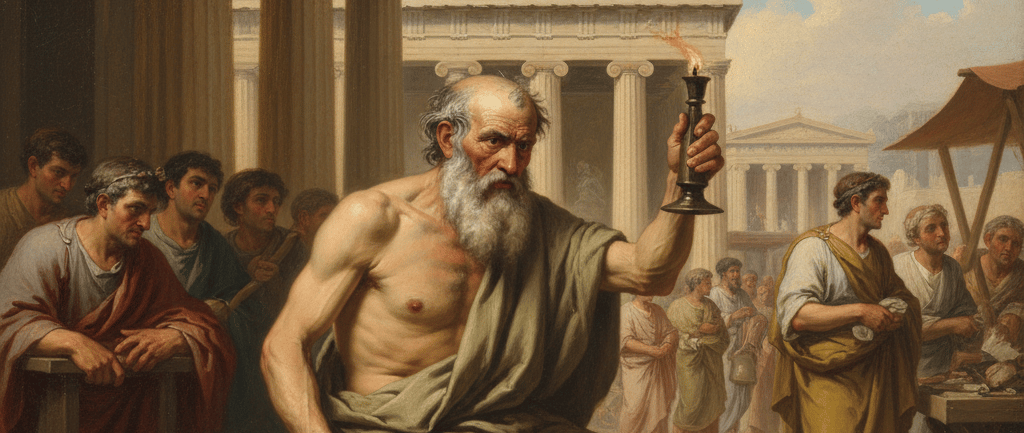An Introduction to Diogenes the Cynic: The Original Minimalist
When “minimalism” trends on social media, most people think of clean homes, capsule wardrobes, and living with fewer possessions. But did you know that the idea of minimalism has roots that go all the way back to ancient Greece? Meet Diogenes the Cynic, the philosopher who lived 2,300 years ago—and who could be called the original minimalist. While today minimalism is often about aesthetics, for Diogenes it was about radical freedom and questioning the unnecessary rules of society.
NON-STOIC PHILOSOPHIES
8/23/20252 min read
Who Was Diogenes the Cynic?
Diogenes (c. 412–323 BCE) was a Greek philosopher and one of the founders of Cynicism, a school of thought that valued simple living, honesty, and self‑sufficiency.
He rejected wealth, power, and social conventions.
He lived in a large clay jar (often described as a barrel) in Athens, keeping only the bare essentials.
Instead of chasing status, he believed virtue and happiness came from living in harmony with nature.
Legend has it that Alexander the Great once visited Diogenes and asked if there was anything he could do for him. Diogenes replied simply: “Yes, stand out of my sunlight.”
This captures the essence of his philosophy: freedom is found in needing less, not more.
Why Call Diogenes the “Original Minimalist”?
Modern minimalists promote the idea that less clutter equals more space for joy, focus, and meaning. Diogenes embodied this centuries before it became trendy:
He owned almost nothing—just a cloak and a bowl, though even the bowl he discarded after seeing a child drink water with his hands.
He taught that material possessions distract us from developing inner strength and wisdom.
He mocked social conventions, encouraging people to ask: Do I really need this, or is it just social pressure?
In essence, Diogenes’ life shows that minimalism is more than design—it’s a way of questioning what really matters.
Lessons from Diogenes for Today
Even though he lived in ancient Athens, Diogenes’ ideas feel surprisingly modern:
Simplify your needs: The fewer things you depend on, the freer you become.
Question social norms: Just because society says success = wealth doesn’t mean it’s true.
Value authenticity: Diogenes wasn’t afraid to live differently, even if people laughed at him.
Practice self‑sufficiency: Instead of chasing validation, cultivate inner strength.
Applied today, his philosophy can help us resist consumerism, reduce stress, and live more intentionally.
Diogenes’ Relevance in the Age of Consumerism
We live in a world overflowing with noise—ads telling us to buy more, algorithms pushing us to compare ourselves, and culture insisting that happiness comes through achievement. Diogenes provides a refreshing counterpoint:
Maybe happiness doesn’t come from adding more, but from subtracting the unnecessary.
Minimalism isn’t just about a tidy room—it’s about living free from the weight of stuff, status, and ego.
Key Takeaways
Diogenes the Cynic was a Greek philosopher known as the original minimalist.
He rejected material possessions, status, and social conventions.
His life teaches modern lessons about freedom, simplicity, and authenticity.
Minimalism is not just aesthetic—it’s a path to inner strength and independence.
Final Thoughts
Diogenes the Cynic reminds us that minimalism isn’t a 21st‑century invention—it’s a timeless philosophy. By stripping life down to what is essential, he showed that less truly can be more.
The next time you declutter a closet or resist buying something you don’t need, remember Diogenes—living in his jar, free under the sun, proving that happiness thrives on simplicity.


Waste no more time arguing about what a good man should be. Be one - Marcus Aurelius
We suffer more often in imagination than in reality - Seneca
Wealth consists not in having great possessions, but in having few wants - Epictetus
